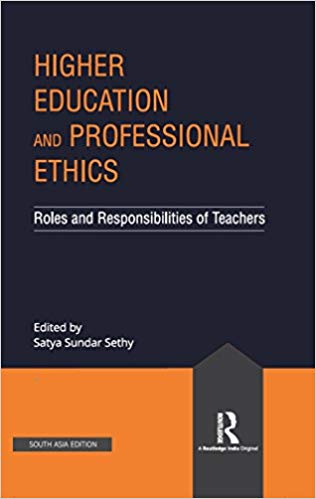The notion of professional ethics in the realm of higher education emerges because it is being recognized that professors and instructors are the one (and in many countries the only) group of teachers who are not required to be trained, educated, certified and licensed to teach. Therefore, they clearly have no structured opportunity to learn about the professional ethics of their roles and responsibilities as teachers. Located within this setup, the book under review, Higher Education and Professional Ethics, brings together a rich collection of chapters that have been thoughtfully categorized under three main themes/parts, namely Philosophy, Education and Professional Ethics; Teaching, Research and Professional Ethics; and Professional Ethics: Case Studies. The authors belong to diverse backgrounds and represent areas of education, disaster studies, technology, ethics per se, sociology, gender studies and social sciences. The collection of writings represents a much needed and a timely discussion in an era in which universities all over are aspiring to achieve excellence in teaching, research and engagement. They are expected to be creators and repositories of new, positive ideas that promote openness of mind, and as Behari and Saxena (2017) put it, ‘ . . . values of empathy, ethics, respect for diversity, freedom with responsibility, creativity and humaneness become the basic foundation for any University.’
Some of the issues that cut across the various chapters in the book are: Is teaching a professional activity or not? Does society proclaim ‘teaching’ a profession? Is teaching an art or a skill? Are teachers born or made? Do research works have ethical considerations? Another special feature of the book is the cross references made to the notion of teaching and learning for which the National Policy on Education 1986 and the National Knowledge Commission have been quoted. Looking at it conceptually, while dwelling upon the role of teachers, the argument could have been further strengthened by referring to the National Curriculum Framework (NCF) 2005.
The first part of the volume with five chapters provides a detailed sketch on diverse topics. The first chapter deliberates upon select issues pertaining to academic ethics in Indian higher education in the era of markets, highlighting the point that the universities have had to revisit their ways of functioning because of the rise of market dominance in the economy along with demographic factors. The case of India is well presented, and the author says that the ‘commodification’ of education has ultimately impacted the students, higher education institutions and teachers. What is commendable in the chapter is the use of varied instances and examples to illustrate the observed trends, and suggest strategies to reclaim the ethics of higher education. The second chapter presents, as its backdrop, a vivid discussion on the recently introduced Choice Based Credit System (CBCS) and situates the role of teachers within this milieu. What emerges significantly at the end of the chapter is the author’s well supported, evidence-based stance using both primary and secondary data, that, as long as teachers understand their own ethics of being a professional and are aware of their rights and responsibilities, and follow the given code of teaching profession, they will not encounter any ethical issues as a teacher under the ambit of this academic reform. The third chapter is pertinent, particularly in the context of the mandate calling for the formation of an Internal Complaints Committee in all institutions to monitor ethical issues related to teaching, learning and research. This chapter gives a lucid view of the need for character development of teachers in higher education settings. Even though the fourth chapter presents an engineering perspective to professional ethics, thereby bringing out the technical curriculum part of higher education, it leaves little doubt that it is equally, if not more, applicable to all areas of higher education. The author’s comments on why teaching professional ethics need not entail teaching moral theory adds an interesting conclusion to the chapter. The last chapter in the first section provides a meaningful micro level analysis of how neo-liberal pressures have transformed work culture and, consequently, an understanding of the teachers’ ethical responsibilities in higher education. The author’s argument is adequately placed within the theoretical writings of Foucault and his explanations of government, power and knowledge.

